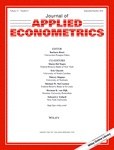
Bloemen, H. and Kapteyn, A. (2008). The estimation of utility-consisten labor supply models by means of simulated scores Journal of Applied Econometrics, 23(4):395--422.
-
Affiliated author
-
Publication year2008
-
JournalJournal of Applied Econometrics
We consider a utility-consistent static labor supply model with flexible preferences and a nonlinear and possibly non-convex budget set. Stochastic error terms are introduced to represent optimization and reporting errors, stochastic preferences, and heterogeneity in wages. Coherency conditions on the parameters and the support of error distributions are imposed for all observations. The complexity of the model makes it impossible to write down the probability of participation. Hence we use simulation techniques in the estimation. We compare our approach with various simpler alternatives proposed in the literature. Both in Monte Carlo experiments and for real data the various estimation methods yield very different results. Copyright {\textcopyright} 2008 John Wiley \& Sons, Ltd.